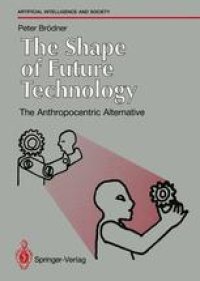
Ebook: The Shape of Future Technology: The Anthropocentric Alternative
Author: Peter Brödner (auth.)
- Tags: Computer-Aided Engineering (CAD CAE) and Design, Artificial Intelligence (incl. Robotics), Control Robotics Mechatronics, Engineering Economics Organization Logistics Marketing
- Series: The Springer Series on Artificial Intelligence and Society
- Year: 1990
- Publisher: Springer-Verlag London
- Edition: 1
- Language: English
- pdf
Mike Cooley One of the most remarkable features of modern industrial society, is the gap between that which technology could provide for society (its potential) and that which it actually does provide for society (its reality). We have for example, complex control systems which can guide a missile to another continent with extraordinary accuracy, yet the blind and the disabled have to stagger around our cities in very much the same way as they did in mediaeval times. There are advanced communication systems enabling messages to be sent around the world in a fraction of a second, but it now takes longer to send an ordinary letter from Washington to New York than it did in the days of the stage coach. Such a growing chasm between potential and reality, is giving rise to a thorough questioning of many of the orthodoxies in these areas and the priorities on which they are based. Similar contradictions, even if at this stage less obvious and dramatic, abound in the field of manufacturing technology. There, we find technologies which have the potential of liberating human beings from soul destroying, routine, backbreaking tasks and leave them free to engage in more creative work, but which in reality, often end up reducing the human being to a mere machine appendage, acted upon by the technology and becoming a passive, pathetic element in the productive system rather than a creative, dynamic human being.
This is a translation - with some new material - of a seminal contribution to the debate about the design of tomorrow's factories in the light of advancing computer and control technology. Peter Br?dner contrasts mass production with workshop production and challenges the assertion that modern production systems create multi-faceted and responsible tasks requiring correspondingly intense training. He analyses the impact of automation on intellectual work and knowledge-based systems. Is the "workerless factory" possible, or even desirable? Can we avoid the future shown in Lang's Metropolis? Can computers really be made to help rather than replace the workforce? Peter Br?dner succeeds in transforming a sociological critical study and economic analysis into a series of convincing technological proposals, based on his thorough understanding of production technologies gained whilst working at the Production Engineering Centre in Karlsruhe. The book was originally published in German under the title Fabrik 2000.
This is a translation - with some new material - of a seminal contribution to the debate about the design of tomorrow's factories in the light of advancing computer and control technology. Peter Br?dner contrasts mass production with workshop production and challenges the assertion that modern production systems create multi-faceted and responsible tasks requiring correspondingly intense training. He analyses the impact of automation on intellectual work and knowledge-based systems. Is the "workerless factory" possible, or even desirable? Can we avoid the future shown in Lang's Metropolis? Can computers really be made to help rather than replace the workforce? Peter Br?dner succeeds in transforming a sociological critical study and economic analysis into a series of convincing technological proposals, based on his thorough understanding of production technologies gained whilst working at the Production Engineering Centre in Karlsruhe. The book was originally published in German under the title Fabrik 2000.
Content:
Front Matter....Pages i-viii
Introduction....Pages 1-6
The Factory of the Future....Pages 7-14
The Origins and Nature of the Factory....Pages 15-39
The Technocentric Route: Fossilized Taylorism....Pages 41-80
The Anthropocentric Route: The Return of the Human Being....Pages 81-115
Horizons New: Farewell to Necessary Work?....Pages 117-129
Back Matter....Pages 131-136
This is a translation - with some new material - of a seminal contribution to the debate about the design of tomorrow's factories in the light of advancing computer and control technology. Peter Br?dner contrasts mass production with workshop production and challenges the assertion that modern production systems create multi-faceted and responsible tasks requiring correspondingly intense training. He analyses the impact of automation on intellectual work and knowledge-based systems. Is the "workerless factory" possible, or even desirable? Can we avoid the future shown in Lang's Metropolis? Can computers really be made to help rather than replace the workforce? Peter Br?dner succeeds in transforming a sociological critical study and economic analysis into a series of convincing technological proposals, based on his thorough understanding of production technologies gained whilst working at the Production Engineering Centre in Karlsruhe. The book was originally published in German under the title Fabrik 2000.
Content:
Front Matter....Pages i-viii
Introduction....Pages 1-6
The Factory of the Future....Pages 7-14
The Origins and Nature of the Factory....Pages 15-39
The Technocentric Route: Fossilized Taylorism....Pages 41-80
The Anthropocentric Route: The Return of the Human Being....Pages 81-115
Horizons New: Farewell to Necessary Work?....Pages 117-129
Back Matter....Pages 131-136
....